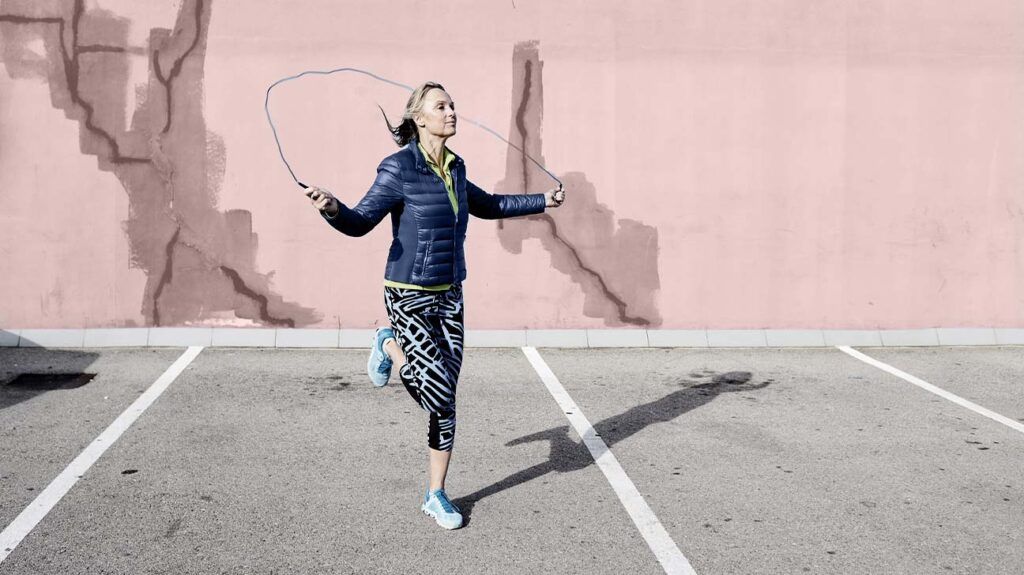When exercising with eczema, taking extra care of the skin is important. Generally, wearing loose, breathable fabrics and taking regular breaks can prevent symptoms from worsening.
Eczema, or atopic dermatitis, is a chronic condition that affects the skin. During a flare, the skin is often very dry, inflamed, and cracked. This compromises the skin barrier and can increase the risk of infection.
That said, eczema flares should not stop anyone from moving their body and engaging in physical exercise regularly.

Here are some tips for exercising with eczema:
1. Wear breathable fabrics that are light and loose
Synthetic fabrics that manufacturers produce artificially can aggravate sensitive skin, especially when the item of clothing is tight.
Sweat
Wearing light, breathable fabrics made from natural materials, such as cotton, can help prevent trapped sweat from accumulating on the skin.
2. Take regular breaks and drink water
Taking time to pause between movements or choosing workouts with built-in breaks, such as strength training, is a good way to stop a flare from worsening.
Building in water breaks keeps the body hydrated. These small pauses also prevent repeated skin friction between movements and help keep the body cool, which reduces sweating.
However, as drinking water
3. Pat away sweat with a damp flannel or a towel
Gently patting away sweat with a damp flannel can help stop it from pooling on the skin and soothe itching.
This may be easier for some than others, depending on where the eczema rash is. Blotting the skin with a towel is another option.
3. Wash off sweat after exercising and use an emollient
After exercising, taking a cool shower or bath removes any residual sweat and can help stop itching, though it is important to avoid using scented soaps.
After gently drying the body, a person can apply a
4. Choose low impact exercises
When a flare is causing more symptoms than usual, a person can choose a lower impact version of an exercise. For example, they may replace running on the treadmill with walking.
Practicing yoga and Pilates may also help, as these mindfulness-based exercises are unlikely to cause excessive sweating.
However, it is important to remember that there may be occasions when a flare is so severe that taking a rest day is the safest option.
Any exercise that does not cause excessive sweating is a sensible choice when eczema is flaring. It is best to choose a physical activity that people can modify to be low impact.
Examples of low impact forms of exercise include:
- swimming
- light jogging
- walking
- leisurely cycling
- strength training
- yoga
When people exercise, their body temperature increases, causing them to sweat. Sweat
However, lower impact versions of exercises help people maintain a healthy exercise routine without experiencing worsening eczema symptoms.
A
Useful tips for managing eczema may include:
- wearing breathable fabrics
- having a regular skin care routine
- reading labels on skin care and makeup products carefully
- tracking triggers, such as food, stress, and pet dander
- keeping hydrated
- staying active
- getting adequate sleep
- reducing stress, where possible
Below are answers to some common questions about eczema and exercise:
Can a person work out with eczema?
A person can work out when they have eczema. However, when a flare is particularly severe, it is best to choose a low impact form of exercise that does not cause a person to sweat. On days when the skin is particularly sore, it may be beneficial to take a rest day instead of working out.
Does eczema get worse with exercise?
Eczema does not necessarily get worse with exercise. Maintaining a healthy exercise routine has
Can sweating make eczema worse?
Sweating
When exercising with eczema, it is best to wear breathable clothes in natural fabrics, such as cotton. Synthetic fabrics can trap sweat and potentially aggravate symptoms. Other helpful tips include staying hydrated and taking plenty of breaks.
Low impact exercises that do not raise body temperature too much are suitable for people experiencing an eczema flare. Examples of low impact exercises include swimming, yoga, and walking.
